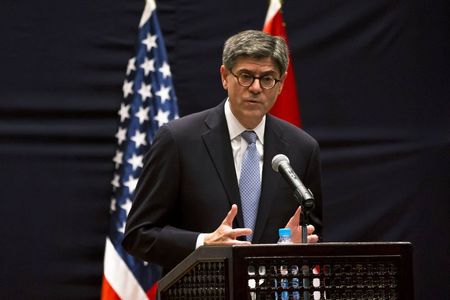By Bill Rigby and Anna Yukhananov
SEATTLE/WASHINGTON (Reuters) - The United States on Wednesday stepped up calls on European policymakers to do more to avoid a "lost decade" of low growth, saying steps taken by the European Central Bank may not be sufficient on their own.
U.S. Treasury Secretary Jack Lew gave an unusually blunt assessment of what he thinks Europe needs to do, arguing that France and Italy should rein in budget deficits more slowly and that it was "critical" Germany and Netherlands open their fiscal purse strings.
"Resolute action by national authorities and other European bodies is needed to reduce the risk that the region could fall into a deeper slump," Lew said at the World Affairs Council in Seattle.
Speaking ahead of the summit of leaders from the Group of 20 nations in Australia this week, he said euro zone countries should pursue a combination of fiscal, monetary and structural policies to support growth.
His comments suggested the euro zone's sluggish recovery will come under the G20 spotlight, as it has during their last two sessions.
The 18-nation euro zone is skirting close to recession, growing just 0.1 percent in the second quarter, and the currency bloc is also not far from outright deflation.
To prop up the economy and move inflation higher, the ECB has started to pump more money into the region's banking system, and has said it is ready to take further action if needed.
In contrast, the U.S. economy is growing solidly. Lew warned, however, that the world could not rely on strong U.S. growth alone to support demand. He urged countries to use fiscal policies to boost demand if they could afford to.
Germany, Europe's biggest economy, has been under particular pressure to increase government stimulus to support demand in the euro zone.
Lew also said Italy and France should pursue structural reforms but cautioned it was still unclear whether such reforms will be enough in the case of Japan.
Japan has launched a broad programme of monetary easing, spending and reform to generate economic growth and pull out of damaging deflation. At the same time, Tokyo has raised taxes in a bid to rein in its large deficits.

Lew said that if Japanese officials decided to go ahead with another planned consumption tax increase, they should use other policies to more than offset the drag on the economy.
(Reporting by Bill Rigby in Seattle and Anna Yukhananov in Washington; Additional reporting by Jason Lange and Tim Ahmann in Washington; Editing by W Simon, Meredith Mazzilli and James Dalgleish)
